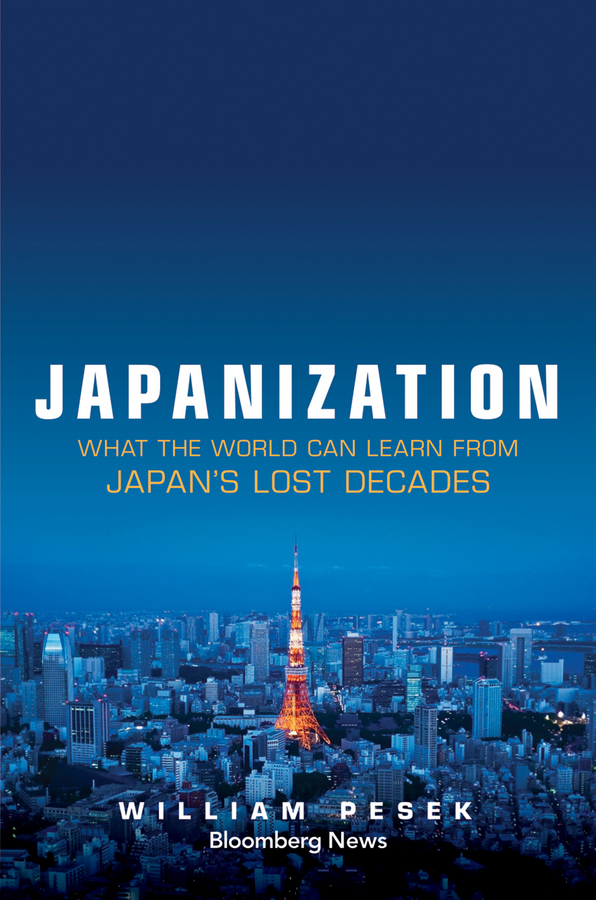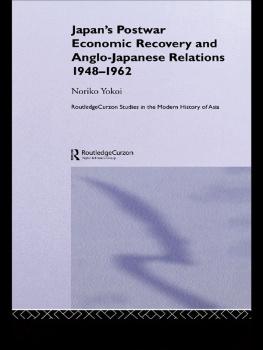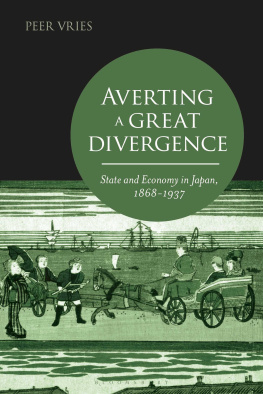Contents
Pages
Guide

Contents
Since 1996, Bloomberg Press has published books for financial professionals, as well as books of general interest in investing, economics, current affairs, and policy affecting investors and business people. Titles are written by well-known practitioners, BLOOMBERG NEWS reporters and columnists, and other leading authorities and journalists. Bloomberg Press books have been translated into more than 20 languages.
For a list of available titles, please visit our Web site at www.wiley.com/go/bloombergpress.
Japanization
What the World Can Learn from Japans Lost Decades
William Pesek
Cover image: iStockphoto.com/kokouu
Cover design: Wiley
Copyright 2014 by William Pesek.
Published by John Wiley & Sons Singapore Pte. Ltd. 1 Fusionopolis Walk, #07-01, Solaris South Tower, Singapore 138628
All rights reserved.
No part of this publication may be reproduced, stored in a retrieval system, or transmitted in any form or by any means, electronic, mechanical, photocopying, recording, scanning, or otherwise, except as expressly permitted by law, without either the prior written permission of the Publisher, or authorization through payment of the appropriate photocopy fee to the Copyright Clearance Center. Requests for permission should be addressed to the Publisher, John Wiley & Sons Singapore Pte. Ltd., 1 Fusionopolis Walk, #07-01, Solaris South Tower, Singapore 138628, tel: 65-6643-8000, fax: 65-6643-8008, e-mail: .
Limit of Liability/Disclaimer of Warranty: While the publisher and author have used their best efforts in preparing this book, they make no representations or warranties with respect to the accuracy or completeness of the contents of this book and specifically disclaim any implied warranties of merchantability or fitness for a particular purpose. No warranty may be created or extended by sales representatives or written sales materials. The advice and strategies contained herein may not be suitable for your situation. You should consult with a professional where appropriate. Neither the publisher nor the author shall be liable for any damages arising herefrom.
Other Wiley Editorial Offices
John Wiley & Sons, 111 River Street, Hoboken, NJ 07030, USA
John Wiley & Sons, The Atrium, Southern Gate, Chichester, West Sussex, P019 8SQ, United Kingdom
John Wiley& Sons (Canada) Ltd., 5353 Dundas Street West, Suite 400, Toronto, Ontario, M9B 6HB, Canada
John Wiley& Sons Australia Ltd., 42 McDougall Street, Milton, Queensland 4064, Australia
Wiley-VCH, Boschstrasse 12, D-69469 Weinheim, Germany
Library of Congress Cataloging-in-Publication Data
ISBN 978-1-118-78069-5 (Hardcover)
ISBN 978-1-118-78070-1 (ePDF)
ISBN 978-1-118-78072-5 (ePub)
For Eriko. Of course.
Preface
Few words strike greater fear in the hearts of economists and politicians than Japanization. That specter of chronic malaise, deflation, crushing debt, and political paralysis drove central bankers from Ben Bernanke in the United States to Mario Draghi in Europe to flood markets with liquidity as never before in an all-out effort to avert their own lost decades.
Decades ago, the fear was of Japanese dominance. Ezra Vogels 1979 bestseller, Japan as Number One, was emblematic of passions across the Pacific. The Harvard University social sciences professor sketched out a scenario of a tiny island nation with no natural resources dominating the economic world that seemed as plausible as frightening to the American and Europe business elites.
Subsequent years would see entire generations of editors rushing Japanese-are-coming scare pieces into print. Time magazines March 30, 1981, Japan cover, The Worlds Toughest Competitor, was illustrative of the hysteria, as was the timing. Amid oil shocks, stagflation, fiscal crises, and the Iran hostage crisis, Japans meteoric rise was an existential blow to an America whose main business was doing business better than anyone.
Over the next decade, Japan was just as exciting and feared in world economic terms as China is today. Its companies and banks dominated top-10 lists, while once-proud U.S. automakers were eating Japans exhaust. If you wanted to see some of your favorite Van Gogh, Picasso, or Warhol paintings, you had to visit Tokyo or Osaka. As jewels like Rockefeller Center, Universal Studios, Pebble Beach golf course, and myriad skyscrapers fell into Japanese hands, commentators screamed about the commercial equivalent of Pearl Harbor. Japan-bashing was sweeping Capitol Hill, too. In 1990, Congresswoman Helen Bentley said the United States is rapidly becoming a colony of Japan.
By 1992, when Michael Crichtons jingoistic novel, Rising Sun, about economic imperialism, hit bookshelves, it was already over. By the time the film version of Rising Sun, starring Sean Connery and Wesley Snipes, began in theaters in 1993, the Nikkei was plunging and Japans fabled banks were in need of government bailouts. The Nikkei 225 stock averagewhich peaked at 38,957was in freefall and taking Japans once-limitless confidence down with it.
Since then, Japan has ricocheted from one hapless government to the next (its had 16 prime ministers since 1990 to Americas four presidents), rolled out trillions of dollars of stimulus packages, cut interest rates to zero and below, and done battle with currency markets to weaken the yen countless times, and still deflation has deepened and growth has remained negligible. This noxious mix of trifling growth, high debt, falling consumer prices, waning confidence, and political dysfunction has come to be known as Japanization.
It should worry China, then, that experts on this dreaded scenario are turning their attention to Beijing. Take Brian Reading, whose quest to understand what the world can learn from Tokyos mess dates back to his 1992 book, Japan: The Coming Collapse. In July 2013, he wrote a 40-page report with Lombard Street Research Ltd. colleague Diana Choyleva, titled Chinas Chance to Avoid Japans Mistakes.
Over in Hong Hong, investor inquiries on the similarities between China and Japan also drove JPMorgan Chase & Co. economist Grace Ng to revisit the topic. Her warnings that China today and Japan in the 1980s share an uncannily similar build-up in broad measures of credit to almost double the economys size brought furrows to many a brow in Beijing.
So, just how susceptible is China to Japanization? How vulnerable, for that matter, are the much larger economies of the United States and the European Union? The answer, at least to varying degrees, is quite a bit. The same could be said for India, Indonesia, Thailand, and other developing economies if national leaders arent careful.
In February 2009, none other than U.S. President Barack Obama cited Japans lost decade as something his presidency would seek to avoid. In July 2010, James Bullard, president of the Federal Reserve Bank of St. Louis, warned that America could be enmeshed in a Japanese-style deflationary outcome within the next several years.
When economist Lawrence Summers warned of a secular stagnation, an economic rout that has more or less become permanent, on November 8, 2013, he was indeed hinting at such an outcome. As the world emerges from the wreckage of Wall Streets 2008 crash and Europes own crisis deepens, few lessons are more timely or critical than those offered by Japan, a once-vibrant model for developing economies that joined the worlds richest nations, lost its way, and has been struggling to relocate it ever since. Its deflation, tepid growth, waning consumer spending, and monumental debt buildup were met with timidity at the governments highest levels, compounding Japans pain. Conventional tools like fiscal spending and lower borrowing costs did little to revitalize growth and have lost potency.









